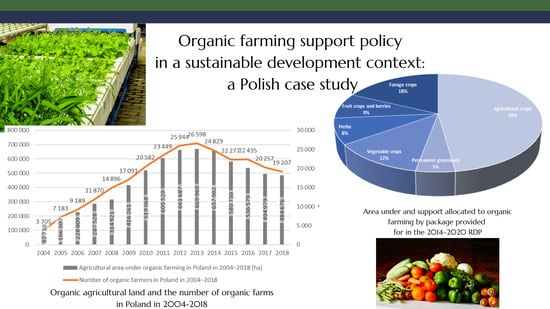Organic Farming Support Policy in a Sustainable Development Context: A Polish Case Study
Abstract
1. Introduction
2. Background: Organic Farming in Poland
3. Method and Materials
4. Results
5. Discussion
6. Conclusions
Author Contributions
Funding
Institutional Review Board Statement
Informed Consent Statement
Data Availability Statement
Conflicts of Interest
References
- Brzezina, N.; Biely, K.; Helfgott, A.; Kopainsky, B.; Vervoort, J.; Mathijs, E. Development of organic farming in Europe at the crossroads: Looking for the way forward through system archetypes lenses. Sustainability 2017, 9, 821. [Google Scholar] [CrossRef]
- Cooper, T.; Hart, K.; Baldock, D. The Provision of Public Goods through Agriculture in the European Union; Report prepared for DG Agriculture and Rural Development, Contract No 30-CE-0233091/00-28; Institute for European Environmental Policy: London, UK, 2009; Available online: https://ieep.eu/archive_uploads/457/final_pg_report.pdf (accessed on 6 May 2021).
- Jespersen, L.M.; Baggesen, D.L.; Fog, E.; Halsnæs, K.; Hermansen, J.E.; Andreasen, L.; Strandberg, B.; Sørensen, J.T.; Halberg, N. Contribution of organic farming to public goods in Denmark. Org. Agric. 2017, 7, 243–266. [Google Scholar] [CrossRef]
- Kirschenmann, F. Alternative agriculture in an energy- and resource-depleting future. Renew. Agric. Food Syst. 2010, 25, 85–89. [Google Scholar] [CrossRef]
- Lampkin, N.H. Organic farming: Sustainable agriculture in practice. In The Economics of Organic Farming: An International Perspective; Lampkin, N.H., Padel, S., Eds.; CAB International: Wallingford, UK, 1994; pp. 3–9. [Google Scholar]
- Mondelaers, K.; Aertsens, J.; Van Huylenbroeck, G. A meta-analysis of the differences in environmental impacts between organic and conventional farming. Br. Food J. 2009, 111, 1098–1119. [Google Scholar] [CrossRef]
- Youngberg, G.; DeMuth, S. Organic agriculture in the United States: A 30-year retrospective. Renew. Agric. Food Syst. 2013, 28, 294–328. [Google Scholar] [CrossRef]
- Eyhorn, F.; Muller, A.; Reganold, J.P.; Frison, E.; Herren, H.R.; Luttikholt, L.; Mueller, A.; Sanders, J.; El-Hage Scialabba, N.; Seufert, V.; et al. Sustainability in global agriculture driven by organic farming. Nat. Sustain. 2019, 2, 253–255. [Google Scholar] [CrossRef]
- Luttikholt, L.W.M. Principles of organic agriculture as formulated by the Internatinal Federation of Organic Agriculture Movements. NJAS Wagen. J. Life Sci. 2007, 54, 347–360. [Google Scholar] [CrossRef]
- European Commision. Council Regulation (EC) No 834/2007 of 28 June 2007 on Organic Production and Labelling of Organic Products and Repealing Regulation (EEC) No 2092/91; European Commission: Brussels, Belgium, 2007; Available online: https://eur-lex.europa.eu/legal-content/EN/TXT/?uri=celex%3A32007R0834 (accessed on 6 May 2021).
- Halberg, N. Assessment of the environmental sustainability of organic farming: Definitions, indicators and the major challenges. Can. J. Plant. Sci. 2012, 92, 981–996. [Google Scholar] [CrossRef]
- Reganold, J.P.; Wachter, J.M. Organic agriculture in the twenty-first century. Nat. Plants 2016, 2, 15221. [Google Scholar] [CrossRef] [PubMed]
- Rigby, D.; Cáceres, D. Organic farming and the sustainability of agricultural systems. Agric. Syst. 2001, 68, 21–40. [Google Scholar] [CrossRef]
- Głodowska, M.; Gałązka, A. Wpływ rolnictwa ekologicznego na środowisko w koncepcji rozwoju zrównoważonego (Impact of organic farming on natural environment within the concept of sustainable development). Wieś Rol. 2017, 2, 147–165. [Google Scholar] [CrossRef]
- IFOAM—Organics International. Principles of Organic Agriculture; IFOAM Head Office: Bonn, Germany, 2020; Available online: https://www.ifoam.bio/principles-organic-agriculture-brochure (accessed on 6 May 2021).
- Kratochvil, R. Organic farming: An approach to make agriculture agriculture more sustainable? Jahrb. Österr. Ges. Agrarökon. 2005, 12, 245–260. Available online: https://oega.boku.ac.at/fileadmin/user_upload/Tagung/2002/02_Kratochvil.pdf (accessed on 6 May 2021).
- Guthman, J. Raising organic: An agro-ecological assessment of grower practices in California. Agric. Hum. Values 2000, 17, 257–266. [Google Scholar] [CrossRef]
- Darnhofer, I.; Fairweather, J.; Moller, H. Assessing a farm’s sustainability: Insights from resilience thinking. Int. J. Agric. Sustain. 2010, 8, 186–198. [Google Scholar] [CrossRef]
- Noe, E.; Halberg, N.; Reddersen, J. Indicators of biodiversity and conservational wildlife quality on Danish organic farms for use in farm management: A multidisciplinary approach to indicator development and testing. J. Agric. Environ. Ethics 2005, 18, 383–414. [Google Scholar] [CrossRef]
- Hodge, I. Sustainability: Putting Principles into Practice. An Application to Agricultural Systems; Paper presented to ‘Rural Economy and Society Study Group’ December 1993; Royal Holloway College: Egham, UK, 1993. [Google Scholar]
- Pretty, J.N. Regenerating Agriculture: Policies and Practice for Sustainability and Self-Reliance; Joseph Henry Press: Washington, DC, USA, 1995. [Google Scholar] [CrossRef]
- Brunstad, R.J.; Gaasland, I.; Vårdal, E. Agriculture as a provider of public goods: A case study for Norway. Agric. Econ. 1995, 13, 39–49. [Google Scholar] [CrossRef]
- Nieberg, H.; Kuhnert, H. Support policy for organic farming in Germany. Landbauforsch. Volkenrode 2007, 57, 95–106. Available online: https://literatur.thuenen.de/digbib_extern/bitv/dk038114.pdf (accessed on 6 May 2021).
- Stolze, M.; Lampkin, N. Policy for organic farming: Rationale and concepts. Food Policy 2009, 34, 237–244. [Google Scholar] [CrossRef]
- Schwarz, G.; Nieberg, H.; Sanders, J. Organic Farming Support Payments in the EU; Landbauforschung/Sonderheft 339. vTI Johann Heinrich von Thünen-Institut: Braunschweig, Germany, 2010; Available online: https://www.openagrar.de/receive/timport_mods_00006163 (accessed on 6 May 2021).
- Nieberg, H.; Offermann, F.; Zander, K. Organic Farms in a Changing Policy Environment: Impact of Support Payments, EU-Enlargement and the Luxembourg Reform. In Organic Farming in Europe: Economics and Policy Vol. 13; University of Hohenheim Institute für Landwirtschaftl Betriebslehre: Stuttgart, Germany, 2007. [Google Scholar]
- Zander, K.; Nieberg, H.; Offermann, F. Financial relevance of organic farming payments for Western and Eastern European organic farms. Renew. Agric. Food Syst. 2008, 23, 53–61. [Google Scholar] [CrossRef]
- Lesjak, H.A. Explaining organic farming through past policies: Comparing support policies of the EU, Austria and Finland. J. Clean. Prod. 2008, 16, 1–11. [Google Scholar] [CrossRef]
- Moschitz, H.; Stolze, M. Organic farming policy networks in Europe: Context, actors and variation. Food Policy 2009, 34, 258–264. [Google Scholar] [CrossRef]
- Offermann, F.; Nieberg, H.; Zander, K. Dependency of organic farms on direct payments in selected EU member states: Today and tomorrow. Food Policy 2009, 34, 273–279. [Google Scholar] [CrossRef]
- Sanders, J.; Stolze, M.; Padel, S. (Eds.) Use and Efficiency of Public Support Measures Addressing Organic Farming: Study Report; Johann Heinrich von Thünen Institut (vTI), Federal Research Institute for Rural Areas, Forestry and Fisheries: Braunschweig, Germany, 2011; Available online: https://literatur.thuenen.de/digbib_extern/dn050266.pdf (accessed on 6 May 2021).
- Best, H. Organic agriculture and the conventionalization hypothesis: A case study from West Germany. Agric. Hum. Values 2008, 25, 95–106. [Google Scholar] [CrossRef]
- Kratochvil, R.; Leitner, H. The “Trap of Conventionalization”: Organic Farming between Vision and Reality. Paper for Working Group 5 “Continuity and Change in Organic Farming—Philosophy, Practice and Policy”. In Proceedings of the XXI Congress of the ESRS, Keszthely, Hungary, 22–27 August 2005; Available online: https://boku.ac.at/fileadmin/data/H03000/H73000/H73300/PF-BioLandwirtschaft/pubs/Sozokon/2005_Leitner_ESRS.pdf (accessed on 6 May 2021).
- Ministry of Agriculture and Rural Development. Rural Development Plan for 2004–2006; Ministry of Agriculture and Rural Development: Warsaw, Poland, 2005. Available online: https://www.arimr.gov.pl/programy-2002-2013/plan-rozwoju-obszarow-wiejskich-2004-2006.html (accessed on 5 October 2020).
- Ministry of Agriculture and Rural Development. Rural Development Programme for 2007–2013; Ministry of Agriculture and Rural Development: Warsaw, Poland, 2007. Available online: https://www.gov.pl/web/agriculture/rural-development-programme-for-2007-2013 (accessed on 5 October 2020).
- Ministry of Agriculture and Rural Development. Program Rozwoju Obszarów Wiejskich na lata 2014–2020 [Rural Development Programme for 2014–2020]; Ministry of Agriculture and Rural Development: Warsaw, Poland, 2013. Available online: https://www.gov.pl/web/rolnictwo/-program-rozwoju-obszarow-wiejskich-2014-2020-prow-2014-2020 (accessed on 5 October 2020).
- Vittersø, G.; Torjusen, H.; Laitala, K.; Tocco, B.; Biasini, B.; Csillag, P.; de Labarre, M.D.; Lecoeur, J.-L.; Maj, A.; Majewski, E.; et al. Short Food Supply Chains and their contributions to sustainability: Participants’ views and perceptions from 12 European cases. Sustainability 2019, 11, 4800. [Google Scholar] [CrossRef]
- Brodzińska, K. Rozwój rolnictwa ekologicznego w Polsce na tle uwarunkowań przyrodniczych i systemu wsparcia finansowego [Organic farming development in Poland in context of environmental conditions and financial suport system]. Sci. J. Wars. Univ. Life Sci. SGGW Probl. World Agric. 2010, 10, 12–21. [Google Scholar] [CrossRef]
- Kondarotowicz-Pozorska, J. Ekologiczne gospodarstwa rolne jako podmioty sprzyjające zrównoważonemu rozwojowi obszarów wiejskich w Polsce [Ecological farms as element for sustainability development of rural areas in Poland]. Zesz. Nauk. Stud. Prace Wydz. Nauk Ekonom. Zarz. 2014, 35, 71–85. Available online: http://wneiz.pl/nauka_wneiz/sip/sip35-2014/SiP-35-t1-71.pdf (accessed on 6 May 2021).
- Markuszewska, I.; Kubacka, M. Does organic farming (OF) work in favour of protecting the natural environment? A case study from Poland. Land Use Policy 2017, 67, 498–507. [Google Scholar] [CrossRef]
- Biernat-Jarka, A.; Trebska, P. The importance of organic farming in the context of sustainable development of rural areas in Poland. Acta Sci. Pol. Oecon. 2018, 17, 39–47. [Google Scholar] [CrossRef]
- Miśniakiewicz, M.; Suwała, G. Żywność ekologiczna w świadomości Polaków (Ecological food in the consciousness of Poles). Zesz. Nauk. Uniw. Ekonom. Krak. 2006, 705, 57–75. Available online: https://r.uek.krakow.pl/bitstream/123456789/370/1/135831227.pdf (accessed on 6 May 2021).
- Łuczka, W. The changes on the organic food market. J. Agrib. Rural Dev. 2016, 4, 597–605. [Google Scholar] [CrossRef]
- Michalczyk, J. Rynek żywności ekologicznej w warunkach członkostwa Polski w Unii Europejskiej (The market of organic food under conditions of Poland’s membership in the European Union). Pr. Nauk. Uniw. Ekon. Wroc. 2016, 448, 178–192. [Google Scholar] [CrossRef]
- Grzybowska-Brzezińska, M. Organic food market in Poland: Insights opportunities and challenges. In Relationships on Food Markets: Consumers’ Perspectives; Gazdecki, M., Goryńska-Goldmann, E., Eds.; Poznań University of Life Sciences: Poznań, Poland, 2018; pp. 23–45. [Google Scholar] [CrossRef]
- Kułyk, P.; Dubicki, P. Uwarunkowania zachowań konsumentów na rynku żywności ekologicznej (Determinants of consumer behavior on the organic food market). Sci. J. Wars. Univ. Life Sci. SGGW Probl. World Agric. 2019, 19, 19–87. [Google Scholar] [CrossRef]
- IJHARS. Raport o Stanie Rolnictwa Ekologicznego w Polsce w Latach 2017–2018 [The Report on Organic Farming in Poland in 2017–2018]; Agricultural and Food Quality Inspection (IJHARS): Warsaw, Poland, 2019. Available online: https://www.gov.pl/web/ijhars/raport-o-stanie-rolnictwa-ekologicznego-w-polsce (accessed on 6 May 2021).
- Heinze, S.; Vogel, A. Ökologischer Landbau in Deutschland—Zu den Bestimmungsgründen von Umstellung und Rückumstellung [Determinants for the adoption and abandonment of organic farming in Germany]. Ber. Landwirtsch. 2012, 90, 467–489. Available online: https://www.bmel.de/SharedDocs/Downloads/DE/Service/Berichte-Landwirtschaft/2012_Heft3_Band90.pdf;jsessionid=669DF71C060CF67342CD01458B1408D8.live921?__blob=publicationFile&v=2 (accessed on 6 May 2021).
- Flaten, O.; Lien, G.; Koesling, M.; Løes, A.-K. Norwegian farmers ceasing certified organic production: Characteristics and reasons. J. Environ. Manage. 2010, 91, 2717–2726. [Google Scholar] [CrossRef]
- Kuhnert, H.; Behrens, G.; Hamm, U.; Müller, H.; Sanders, J.; Nieberg, H.; Strohm, R. Dauerhafte Ausweitung des ökologischen Landbaus in Deutschland: Analyse der Ausstiege von Betrieben und Entwicklung eines Konzepts zur nachhaltigen Vermeidung [Extension of Organic Farming in Germany: Determination of Reasons for Reconversion of Organic Farms to Conventional Agriculture and Development of a Sustainable Approach to Prevent It]; Förderkennzeichen: 08OE117 und 08OE234; Johann Heinrich von Thünen-Institut Institut für Betriebswirtschaft, Land uns Markt, and Universität Kassel, Fachgebiet Agrar—Und Lebensmittelmarketing: Braunschweig, Germany; Hamburg, Germany; Witzenhausen, Germany, 2013; Available online: https://orgprints.org/22697/1/08OE117-08OE234-22697-vti-nieberg-2013rueckumstellung.pdf (accessed on 6 May 2021).
- Delbridge, T.A.; King, R.P.; Short, G.; James, K. Risk and red tape: Barriers to organic transition for U.S. farmers. Choices 2017, 32, 1–10. [Google Scholar] [CrossRef]
- Łuczka, W.; Kalinowski, S. Barriers to the development of organic farming: A Polish case study. Agriculture 2020, 10, 536. [Google Scholar] [CrossRef]
- Drygas, M.; Nurzyńska, I.; Bańkowska, K. Charakterystyka i Uwarunkowania Rozwoju Rolnictwa Ekologicznego w Polsce: Szanse i Bariery; Wydawnictwo Naukowe Scholar: Warszawa, Poland, 2019. [Google Scholar]
- Willer, H.; Schlatter, B.; Trávnićek, J.; Kamper, L.; Lernoud, J. (Eds.) The World of Organic Agriculture: Statistics and Emerging Trends 2020; Research Institute of Organic Agriculture FIBL and IFOAM—Organics International: Frick, Switzerland; Bonn, Germany, 2020; Available online: https://www.fibl.org/fileadmin/documents/shop/5011-organic-world-2020.pdf (accessed on 6 May 2021).
- Wojciechowska-Solis, J.; Barska, A. Exploring the preferences of consumers’ organic products in aspects of sustainable consumption: The case of the Polish consumer. Agriculture 2021, 11, 138. [Google Scholar] [CrossRef]
- Grzelak, P. Ocena ekonomiczno-rynkowych efektów wsparcia rolnictwa ekologicznego w Polsce na podstawie studiów przypadku z województwa mazowieckiego [Assessment of economic and market impact of the financial support of organic farming in Poland on the basis of a case study from Mazovia voivodship]. Zesz. Nauk. Szk. Gł. Gospod. Wiej. Warsz., Ekon. Organ. Gospod. Żywn. 2011, 87, 95–109. Available online: http://sj.wne.sggw.pl/pdf/EIOGZ_2011_n87_s95.pdf (accessed on 6 May 2021).
- Kociszewski, K. Polityka finansowego wsparcia rolnictwa ekologicznego w Polsce [The policy of financial support for organic farming in Poland]. Pr. Nauk. Uniw. Ekon. Wroc. 2017, 491, 235–243. [Google Scholar] [CrossRef][Green Version]
- Kondratowicz-Pozorska, J. Wsparcie rolnictwa ekologicznego w Polsce w latach 2014-2013 [Support for ecological farms in Poland in 2004-2013 and in the perspective of 2014–2020]. Pr. Nauk. Uniw. Ekon. Wroc. 2014, 361, 108–116. [Google Scholar] [CrossRef]
- Pawlewicz, A.; Szamrowski, P. Funkcjonowanie i rozwój rynku ekologicznych surowców żywnościowych w nowej perspektywie finansowej w latach 2014–2020 [The functioning and development of the organic food raw materials market under the new financial plan for 2014–2020]. Wieś i Rol. 2014, 3, 175–188. Available online: https://kwartalnik.irwirpan.waw.pl/wir/article/view/517/254 (accessed on 23 June 2021).
- Kociszewski, K. Ekologizacja Polskiego Rolnictwa a Jego Równoważonym Rozwój w Warunkach Członkostwa w Unii Europejskiej [The Ecologisation of Polish Agriculture and Its Sustainable Development under Conditions of Membership in the European Union]; Wydawnictwo Uniwersytetu Ekonomicznego: Wrocław, Poland, 2013. [Google Scholar]
- Łuczka, W.; Smoluk-Sikorska, J. Support of organic agricultural holdings in farmers opinion. Folia Pomer. Univ. Technol. Stetin. Oeconomica 2014, 31, 69–78. Available online: http://foliaoe.zut.edu.pl/pdf/files/magazines/2/50/641.pdf (accessed on 23 June 2021).
- Mickiewicz, B. Wybrane opinie rolników z terenu Polski Północno-Zachodniej na temat wdrażania i funkcjonowania programów rolnośrodowiskowych w ich gospodarstwach [Chosen opinions of farmers from north-west region of Poland about implementation and functioning of agri-environmental programmes in their farms]. Ochr. Środ. Zasob. Natur. 2011, 47, 173–184. [Google Scholar]
- Kisiel, R.; Grabowska, N. Rola dopłat unijnych w rozwoju rolnictwa ekologicznego w Polsce na przykładzie województwa podlaskiego [The role of European Union subsidies in the development of organic farming in Poland—An example of Podlasie region]. Woda, Śr., Obsz. Wiej. 2014, 14, 61–73. Available online: https://www.itp.edu.pl/old/wydawnictwo/woda/zeszyt_47_2014/artykuly/Kisiel%20Grabowska.pdf (accessed on 23 June 2021).
- ARMA. Data on Organic Farming in Poland; Unpublished data; Agency for Restructuring and Modernization of Agriculture: Warsaw, Poland, 2021. (In Polish) [Google Scholar]
- NIK. Informacja o Wynikach Kontroli Rolnictwa Ekologicznego w Polsce; Naczelna Izba Kontroli (NIK): Warszawa, Poland, 2010. Available online: https://www.nik.gov.pl/plik/id,1434,vp,1527.pdf (accessed on 6 May 2021).
- Gołasa, P. Changes in European Union support of Polish organic fruit growing. Acta Sci. Pol. Oecon. 2014, 13, 61–70. Available online: http://www.oeconomia.actapol.net/pub/13_2_61.pdf (accessed on 6 May 2021).
- Brodzińska, K. Renta polityczna ziemi w aspekcie dóbr publicznych—Ujęcie teoretyczne i empiryczne [Political rent of agricultural land in terms of public goods—Theoretical and empirical approach]. Zesz. Nauk. Szk. Gł. Gospod. Wiej. Warsz. Ekon. Organ. Gospod. Żywn. 2015, 109, 43–53. [Google Scholar] [CrossRef]
- NIK. Wykorzystanie Środków Publicznych na Uprawy Sadownicze i Jagodowe w Ramach Programów Rolnośrodowiskowych. Informacja o Wynikach Kontroli; Naczelna Izba Kontroli (NIK): Warszawa, Poland, 2014. Available online: https://www.nik.gov.pl/plik/id,8347,vp,10412.pdf (accessed on 6 May 2021).
- Łukomska, A. Wsparcie finansowe rolnictwa ekologicznego w Polsce [Financial support of organic farming in Poland]. Rocz. Nauk. Stow. Ekon. Agrobiz. 2007, 9, 288–293. [Google Scholar]
- Szeląg-Sikora, A.; Cupiał, M. Dynamics of organic farming development and its subsidizing. Agric. Eng. Agric. 2014, 2, 183–192. [Google Scholar] [CrossRef]
- Koloszko-Chomentowska, Z. The economic consequences of supporting organic farms by public funds: Case of Poland. Technol. Econ. Dev. Econ. 2015, 21, 332–350. [Google Scholar] [CrossRef]
- Bielski, P. Rolnictwo ekologiczne jako zawód i powołanie: Studium tożsamości, organizacji i potencjału rozwojowego polskich rolników ekologicznych [Organic farming as a job and a calling]. Qual. Sociol. Review 2009, 5, 67–70. Available online: https://dspace.uni.lodz.pl/xmlui/bitstream/handle/11089/32684/PSJ_monografie_5.pdf?sequence=1&isAllowed=y (accessed on 6 May 2021).
- Smoluk-Sikorska, J.; Malinowski, M.; Łuczka, W. Identification of the conditions for organic agriculture development in Polish districts—An implementation of canonical analysis. Agriculture 2020, 10, 514. [Google Scholar] [CrossRef]
- Komorowska, D. Czynniki kształtujące efektywność gospodarstw ekologicznych o różnej wielkości [Factors determining the effectiveness of ecological farms of different size groups]. Zesz. Nauk. Szk. Gł. Gospod. Wiej. Warsz. Ekon. Organ. Gospod. Żywn. 2013, 104, 125–142. Available online: http://sj.wne.sggw.pl/pdf/EIOGZ_2013_n104.pdf#page=125 (accessed on 22 June 2021).
- Nachtman, G. Dochodowość Gospodarstw Ekologicznych a Wielkość Użytków Rolnych [Profitability of Organic Farms against Utilized Agricultural Area]. Rocz. Nauk. Ekonom. Rol. Rozw. Obsz. Wiej. 2013, 100, 182–196. Available online: http://sj.wne.sggw.pl/pdf/RNR_2013_n1_s182.pdf (accessed on 22 June 2021).
- Krupa, M.; Witkowicz, R.; Jacyk, G. Opłacalność Produkcji w Gospodarstwach Ekologicznych Uczestniczących w Polskim FADN [Cost Effective of Production in Organic Farms Participates in the Polish FADN]. Fragm. Agron. 2016, 33, 45–56. Available online: https://pta.up.poznan.pl/pdf/2016/FA%2033(3)%202016%20Krupa.pdf (accessed on 22 June 2021).
- Szumiec, A. Płatności bezpośrednie jako forma wsparcia dochodów gospodarstw prowadzących ekologiczny chów bydła mięsnego [Direct payments as a form of income support for farms engaged in organic livestock rearing]. Sci. J. Wars. Univ. Life Sci. SGGW Probl. World Agric. 2018, 18, 287–298. [Google Scholar] [CrossRef]
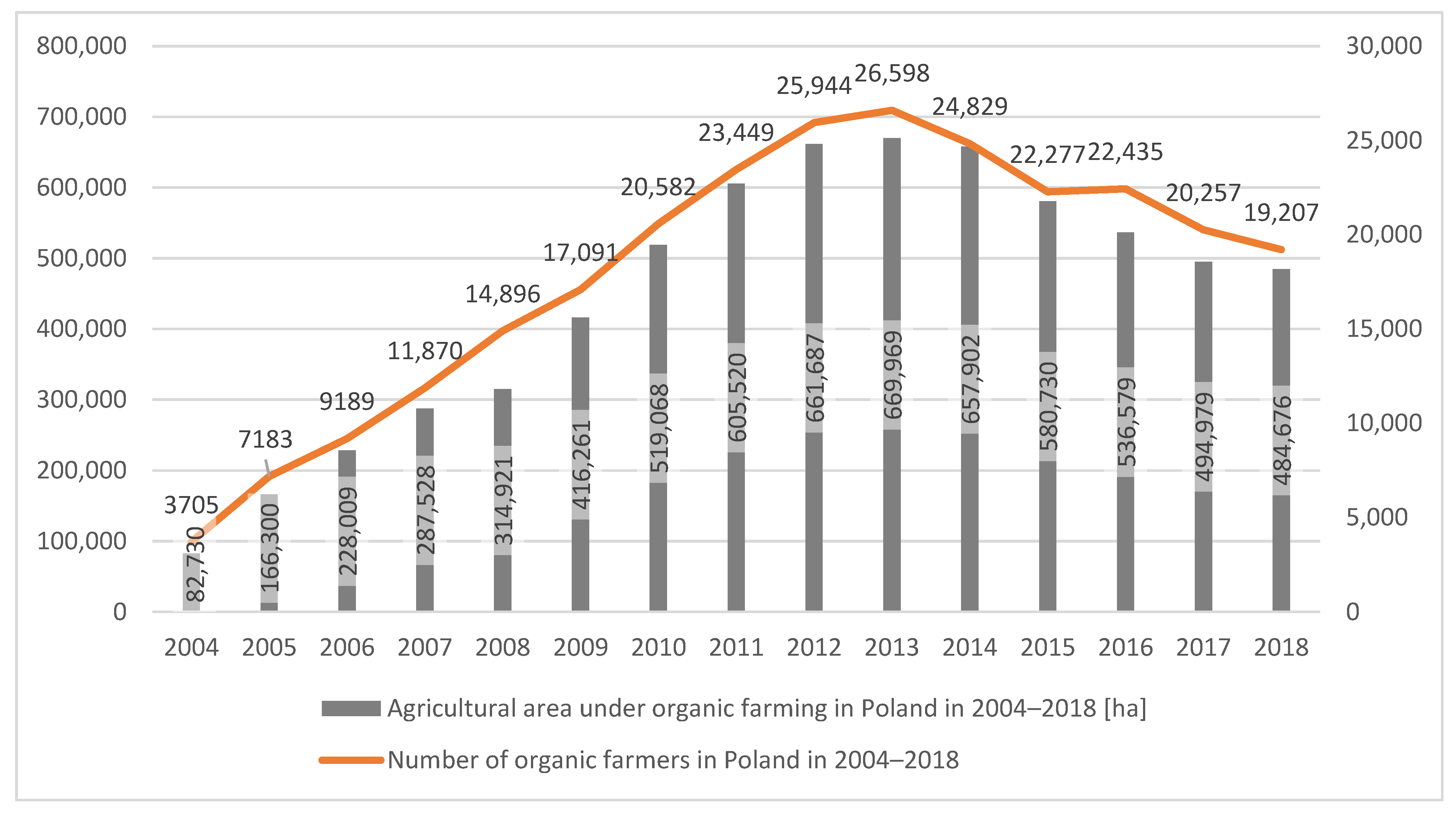
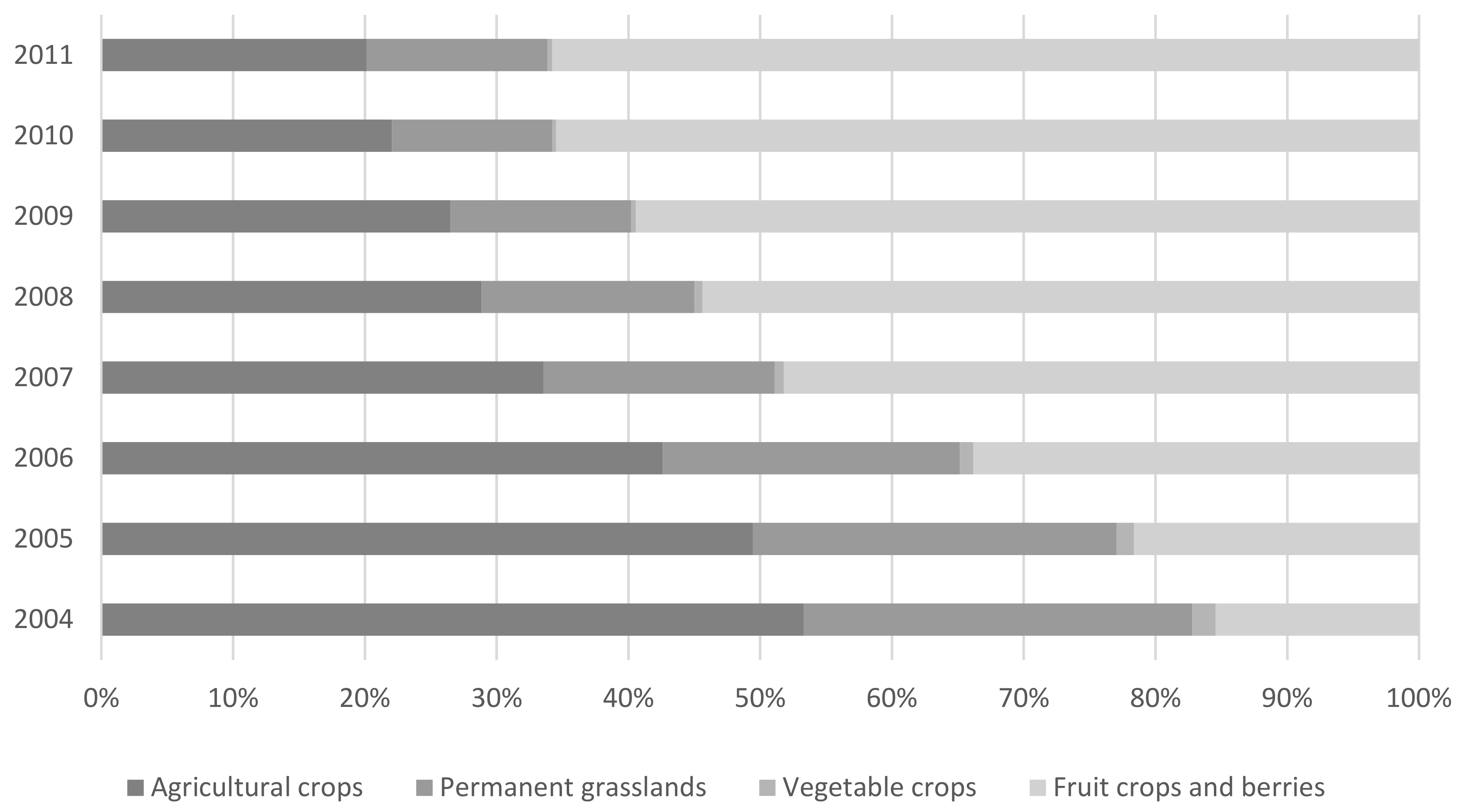
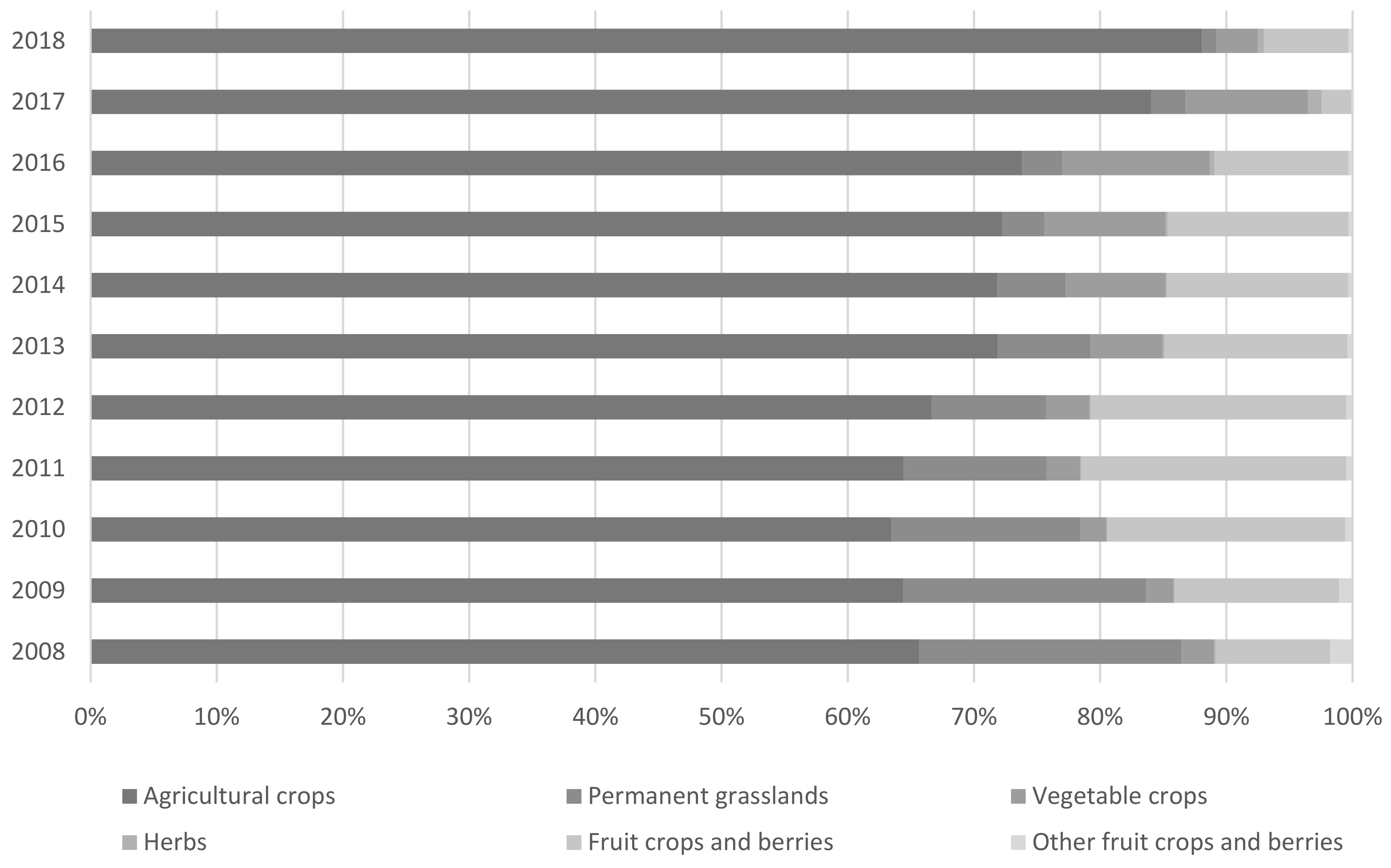

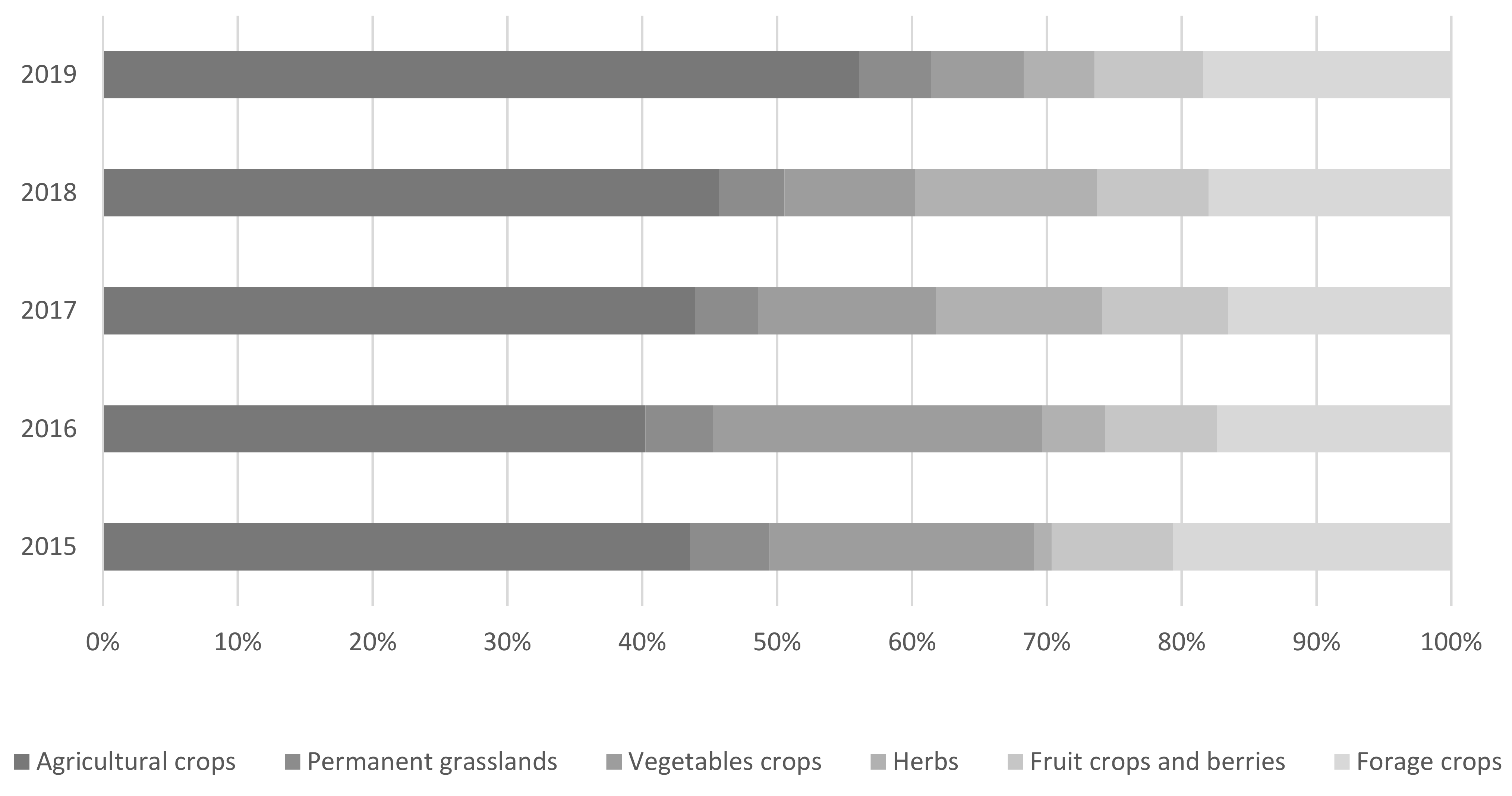
| Option Name | Payment Rates (PLN per Hectare) | |
|---|---|---|
| During the Conversion Period (1–2 Years) | After the Conversion Period (3–5 Years) | |
| Agricultural crops | 680 | 600 |
| Permanent grasslands | 330 | 260 |
| Vegetable crops | 980 | 940 |
| Fruit crops and berries | 1800 | 1540 |
| Options/Packages | Area Covered by Support | Amount of Support | ||
|---|---|---|---|---|
| Area (ha) | Structure (%) | Amount (PLN) | Structure (%) | |
| Agricultural crops | 500,226.2 | 38.1 | 304,535,349.4 | 34.9 |
| Permanent grasslands | 554,589.1 | 42.2 | 144,961,203.7 | 16.6 |
| Vegetable crops | 5903.6 | 0.4 | 5,574,233.5 | 0.6 |
| Fruit crops and berries | 253,757.8 | 19.3 | 417,471,752.9 | 47.8 |
| Total | 1,314,476.7 | 100.0 | 872,542,539.5 | 100.0 |
| Option Name | Payment Rates (PLN per Hectare) | |
|---|---|---|
| During the Conversion Period (1–2 Years) | After the Conversion Period (3–5 Years) | |
| Agricultural crops | 840 | 790 |
| Permanent grasslands | 330 | 260 |
| Vegetable crops | 1550 | 1300 |
| Herbs | 1150 | 1050 |
| Fruit crops and berries | 1800 | 1540 |
| Other fruit crops and berries | 800 | 650 |
| Options/Packages | Area Covered by Support | Amount of Support | ||
|---|---|---|---|---|
| Area (ha) | Structure (%) | Amount (PLN) | Structure (%) | |
| Agricultural crops | 2,248,584.2 | 64.8 | 1,780,495,132.8 | 69.5 |
| Permanent grasslands | 850,172.0 | 24.5 | 217,367,261.6 | 8.4 |
| Vegetable crops | 105,703.4 | 3.0 | 144,130,269.7 | 5.6 |
| Herbs | 4116.7 | 0.1 | 4,159,112.7 | 0.2 |
| Fruit crops and berries | 245,072.5 | 7.1 | 404,659,940.1 | 15.8 |
| Other fruit crops and berries | 17,817.9 | 0.5 | 11,842,001.1 | 0.5 |
| Total | 3,471,466.7 | 100.0 | 2,562,653,718.0 | 100.0 |
| Packages | Options | Payment Rates (PLN per Hectare) | |
|---|---|---|---|
| During the Conversion Period (1–2 Years) | After the Conversion Period (3–5 Years) | ||
| Agricultural crops | 966 | 792 | |
| Permanent grasslands | 428 | 428 | |
| Vegetable crops | 1557 | 1310 | |
| Herbs | 1325 | 1325 | |
| Fruit crops | Basic fruit crops Berries Extensive fruit crops | 1882 1882 790 | 1501 1501 660 |
| Fodder crops cultivated on arable land | 787 | 559 | |
| Packages | Area Covered by Support | Amount of Support | ||
|---|---|---|---|---|
| Area (ha) | Structure (%) | Amount (PLN) | Structure (%) | |
| Agricultural crops | 574,927.4 | 48.1 | 485,380,065.4 | 47.8 |
| Permanent grasslands | 109,832.7 | 9.2 | 51,543,477.6 | 5.1 |
| Vegetable crops | 93,977.6 | 7.9 | 124,089,533.6 | 12.2 |
| Herbs | 67,942.5 | 5.7 | 85,999,617.1 | 8.5 |
| Fruit crops and berries | 58,774.6 | 4.9 | 86,072,765.8 | 8.5 |
| Forage crops | 289,499.7 | 24.2 | 182,245,057.0 | 17.9 |
| Total | 1,194,954.4 | 100.0 | 1,015,330,516.4 | 100.0 |
| Options/Packages | Area Covered by Support | Amount of Support | ||
|---|---|---|---|---|
| Area (ha) | Structure (%) | Amount (PLN) | Structure (%) | |
| Agricultural crops | 3,323,737.8 | 55.6 | 2,570,410,547.6 | 57.8 |
| Permanent grasslands | 1,514,593.9 | 25.3 | 413,871,942.9 | 9.3 |
| Vegetable crops | 205,584.6 | 3.4 | 273,794,036.7 | 6.1 |
| Herbs | 72,059.2 | 1.2 | 90,158,729.8 | 2.0 |
| Fruit crops and berries | 575,422.7 | 9.6 | 908,204,458.8 | 20.4 |
| Forage crops | 289,499.7 | 4.8 | 182,245,057.0 | 4.1 |
| Total | 5,980,897.8 | 100.0 | 4,450,526,773.8 | 100.0 |
Publisher’s Note: MDPI stays neutral with regard to jurisdictional claims in published maps and institutional affiliations. |
© 2021 by the authors. Licensee MDPI, Basel, Switzerland. This article is an open access article distributed under the terms and conditions of the Creative Commons Attribution (CC BY) license (https://creativecommons.org/licenses/by/4.0/).
Share and Cite
Łuczka, W.; Kalinowski, S.; Shmygol, N. Organic Farming Support Policy in a Sustainable Development Context: A Polish Case Study. Energies 2021, 14, 4208. https://doi.org/10.3390/en14144208
Łuczka W, Kalinowski S, Shmygol N. Organic Farming Support Policy in a Sustainable Development Context: A Polish Case Study. Energies. 2021; 14(14):4208. https://doi.org/10.3390/en14144208
Chicago/Turabian StyleŁuczka, Władysława, Sławomir Kalinowski, and Nadiia Shmygol. 2021. "Organic Farming Support Policy in a Sustainable Development Context: A Polish Case Study" Energies 14, no. 14: 4208. https://doi.org/10.3390/en14144208
APA StyleŁuczka, W., Kalinowski, S., & Shmygol, N. (2021). Organic Farming Support Policy in a Sustainable Development Context: A Polish Case Study. Energies, 14(14), 4208. https://doi.org/10.3390/en14144208






